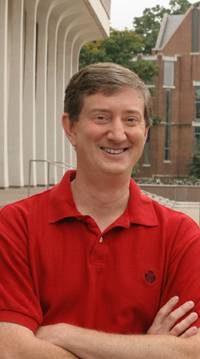From the Dec. 5, 2005, Princeton Weekly Bulletin
Forging ties between technologists and public policy experts, Princeton is creating a research center to address societal issues, such as privacy and security, that arise from advances in computer technology.
The Center for Information Technology Policy will bring leading computer scientists and engineers together with economists, sociologists, lawyers and lawmakers to issue recommendations on topics ranging from ensuring the privacy of medical records to creating fair regulations for Internet phone services.
The University has appointed computer scientist Edward Felten to oversee planning for the center and serve as its first director. Felten, an authority in the area of computer privacy and security, is highly regarded among policy experts for his insights into the broader impacts of computer technology, particularly concerning copyright law. He holds a joint appointment in the Department of Computer Science and the Woodrow Wilson School of Public and International Affairs.
The stakes for how society deals with the regulation of technology are high, said Felten. “Just as technology has pervaded every aspect of our lives, the laws and regulations we pass concerning technology will have major effects on society for decades to come.”
Important decisions about laws and policy are being made without a thorough understanding of technology, while scientists and engineers often do not think through the societal impacts and regulatory reactions their technologies might cause, he said.
“One of the services we can provide is to participate in policy discussions from a technically knowledgeable viewpoint,” Felten said. “We can be in the middle and look at both the policy questions and the technology issues in a more sophisticated way.”
The center will be organized around 18-month-long focus areas during which Princeton will invite specialists from academia, business, government and nonprofit organizations to study, exchange ideas and make recommendations regarding specific problems and opportunities presented by advances in computer technology. At the end of each project, the center will issue a report and hold a policy briefing in Washington, D.C.
One of the potential focus areas is the proliferation of spam e-mails and phishing attacks (fraudulent e-mails aimed at tricking people into divulging private information). While automated filters currently are fairly effective at screening unwanted e-mails, the conflict between spammers and ordinary e-mail users is far from over, according to Felten. In the near future, the convergence of telephone systems and the Internet may allow spammers to make cheap telephone calls from countries that are not subject to the National Do-Not-Call Registry, creating a flood of telemarketing calls and a potentially serious burden for phone systems.
Controlling these problems effectively requires an understanding of technology, laws and market incentives, while misguided solutions could compromise privacy and open communication, Felten said. “Our center is well situated to address the spam problem,” he said. “We have a strong computer science team with expertise ranging from theoretical cryptography to system-building, and we have expertise in economics, sociology, ethics and the international aspects of technology.”
Among other possible subjects for focus areas are: computer viruses, worms and spyware; medical privacy; wireless communication regulation; and electronic voting.
“The Center for Information Technology Policy will help to fill an international need for a more thoughtful approach to dealing with the technological revolution that is changing every part of our lives,” said Anne-Marie Slaughter, dean of the Wilson School. “It also combines some of Princeton’s greatest strengths: a deep understanding of technology and a long history of leading policy discussions at the national and international levels.”
“We would not be doing our job as an engineering school if we focused solely on technical innovation,” said Maria Klawe, dean of engineering. “Both our teaching and research must address the broad impacts that our technological successes have on society.”
The need for a bridge between technology and policy is great, said Felten. “We are experiencing an explosion right now in the regulation of technology,” he said. “Not only do you see the usual government policy-makers, Congress and administrative agencies jumping into these issues, but there’s also a lot more public debate, more advocacy and [more] academic discussion of these issues.”
Princeton sociology professor Paul DiMaggio, who studies the social implications of digital technologies and who will be a participant in the center, said this debate is occurring with little communication between specialists. “For the most part, the social scientists don’t understand the technology, and the technologists are not having conversations with the social scientists.
“At Princeton, I think we really have the potential to create an integrated center that is informed about both the technology and the policy,” DiMaggio said. The center also has an opportunity to train students so that they may have strong backgrounds in both areas. “I think that is very exciting,” DiMaggio said. “The world needs people like that.”
After a period of fund raising, which is expected to support the hiring of additional faculty members and the creation of a visiting scholars program, the center is scheduled to begin work on its first focus area in the fall of 2006.
The creation of the center is one of the major outcomes of the strategic plan adopted by the School of Engineering and Applied Science in 2004. The document, called “Engineering for a Better World: The Princeton Vision,” emphasized the need for interdisciplinary research and a greater understanding of the impact of technology on society.




